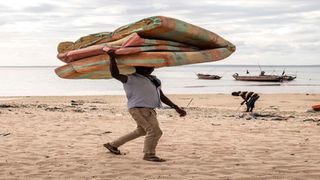
A man carries a mattress as he arrives at Paquitequete beach in Pemba from northern Mozambique on May 22, 2021 after fleeing from violence wreaked by Islamist insurgents.
| John Wessels | AFPAfrica
Premium
Why Mozambique may have to rebuild northern region from scratch
The greatest concern in Mozambique’s northern Cabo Delgado province, which has been hit by a bloody and violent insurgency for over three years now, has mostly been about the lives lost and people displaced.
And rightly so. It is estimated that more than 3,000 people have died so far while over 732,227 have been displaced by the conflict.
But now as the government counts the human cost of this insurgency, authorities acknowledge they may have to start rebuilding this part of the country from scratch. Infrastructure such as roads, schools and banks have been targeted and damaged in Cabo Delgado.
In the last months, officials have reached out to the region and international community, not only to seek help in combating militant groups, but also to repair damaged infrastructure that could make any efforts to return to normalcy difficult when the insurgency ends.
The Southern African Development Community (SADC), to which Mozambique belongs, has deployed troops as has Rwanda, which sent a contingent early in July. Portugal, the US and the EU are now helping the southern African country tackle radicalisation and train local military forces.
Rich but poor
In Mozambique, lives are important, but livelihoods are just as vital. Most of the country’s 31.2 million people live hand to mouth, which means they need a peaceful environment to get out every morning to work in gardens, markets, the nascent gas industry and other activities that could generate a daily income.
“People are suffering and the region will need more time and support to recover from the conflict”, João Feijó, researcher at the Rural Observatory and coordinator of the research and debate programme on violence in Cabo Delgado, told Nation.Africa.
Mozambique is one of the poorest countries in the world, with many people living on less than $1 a day and ranks 181st on the UN Human Development Index out of 189 countries.
But it has enough gas deposits to be the third-largest exporter of the product on the continent, according to the US-based Anadarko Petroleum Corporation. The Texas-based company estimates the country has 100 trillion cubic feet of gas in its concession off the northeastern coast.
Since the insurgency began in 2017, in the region north of the country near the border with Tanzania, its 1.8 million people have not had peace.
Terror attacks
The number of people internally displaced due to attacks had increased from 172,000 in April 2020 to over 732,000 by the end of April 2021, shows data from the UN Office for the Coordination of Humanitarian Affairs (OCHA).
By mid-February 2021, more than three years after the start of the insurgency, 798 incidents of conflict in Cabo Delgado have been recorded, with nearly 4,000 fatalities and 600,000 refugees, says the World Bank.
The attacks began on police stations in Mocimboa da Praia district before they spread to other districts in the northern part of Cabo Delgado, notably in Macomia, Palma and Nangade.
Islamic State-linked militants launched attacks on the northeastern coastal town of Palma on March 24, ransacked buildings and beheaded civilians.
Known locally as Al-Shabaab — but with no relation to the Somali-based terror group by the same name — the militants in Cabo Delgado have launched a series of brazen raids on towns and villages in an apparent bid to establish an Islamic caliphate.
People are fleeing insurgency-hit districts fearing the worst.
Hundreds of survivors of the March 24 terrorist attacks in Cabo Delgado are now living in inhumane conditions in Matemo, a small island in Ibo district that continues to receive hundreds of displaced people from Palma and Macomia districts, O País daily newspaper reported Friday.
The humanitarian drama was confirmed to the publication by members of families who had fled the conflict. Pemba receives, on average, two artisanal vessels daily with survivors of the terrorist attacks.
An estimated three million people are projected to face high levels of food insecurity across the country due to the combined effects of the conflict in the north, weather shocks and Covid-19 mitigation measures, which have restricted economic activity, the World Bank added.
The insurgency has also damaged roads, emptied farms and suspended industries and mining in Cabo Delgado.
“Roads and infrastructure are damaged and unemployment is a reality because of the conflict in Cabo Delgado. This will lead to more social problems”, said Feijó, the Rural Observatory researcher.
A committee of lawmakers visited Cabo Delgado province two months ago and found that there were land conflicts in Montepuez and Ancuabe districts, which received thousands of people fleeing the insurgency.
The local population rejects the expropriation of their land to be handed over to the displaced, MP Manuel Rodrigo Ramessane said.
Mozambique has been receiving aid to mitigate conflicts sparked by the insurgency.
In April, the World Bank approved the country’s eligibility for the Prevention and Resilience Allocation, unlocking up to $700 million in funding to prevent the further escalation of the conflict and build resilience.
In parallel, the World Bank approved a $100 million grant from the International Development Association (IDA) in support of the government’s Northern Crisis Recovery Project.
The project focuses on restoring livelihoods and economic opportunities, building social cohesion and improving access to basic services, as well as rehabilitating selected public infrastructure intended to benefit internally displaced people and host communities in targeted areas of northern Mozambique.




